Water and Health Concerns.
Blue indicates link
Today we are able to choose the type of water we drink. They all have different health benefits. Basic tap water although refined may not be your best choice.
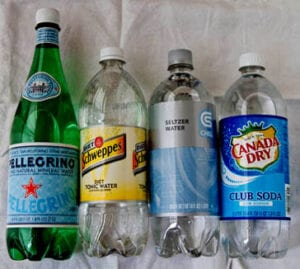
Therefore let us cover a few of the more common types of water we choose to drink.
Tonic Water
Tonic water has a bitter taste that comes from quinine. Quinine is a natural substance found in the bark of the Peruvian cinchona tree, high in the Andes mountains.
Most tonic water brands contain quinine, but the amount may vary from brand to brand.
Health Benefits:
Quinine, a key ingredient in tonic water, can be used to treat malaria. The substance is FDA-approved in specific doses to treat the disease. However, the amount of quinine in tonic water is less than what is generally prescribed for medicinal purposes.
Some consumers have also tried to use quinine for leg cramps. However, the FDA has warned that this off-label use is not recommended and may cause harm.
And finally, some drinkers may use tonic water to relieve stress. Tonic water is often combined with gin to make the popular gin and tonic cocktail. While drinking alcohol in moderation may be safe, drinking too much or too often can cause harm.
Allergies and Interventions:
There is a possibility to have an allergy to quinine that may cause a reaction if you consume tonic water. According to one published report, an allergic reaction may cause thrombocytopenia (blood disorder), neutropenia (hematological disorder), anemia, clotting disorders, acute renal failure, liver toxicity, and neurological abnormalities. Another case report links allergic reactions specifically to tonic water.
Consuming tonic water or if you suspect an allergy to tonic water, seek care from a qualified medical professional.
Tonic water is a non-alcoholic beverage that contains water, carbon dioxide, minerals, and quinine. This carbonated drink contains sugar (mainly using high fructose syrup) additives as sweeteners to create a distinct flavor that most consumers find palatable. These drinks contain preservatives such as Sodium benzoate and other natural flavors.
So, why is it important to know the nutritional value of tonic water? If you are struggling to keep a healthy lifestyle then the drinks (tonic water) you take should be part of your routine check daily. Getting nutritional information helps you to understand the content of calories, fats, and carbs in a can of tonic water.
How much sugar is in tonic water-Is their sugar-free tonic water?
Similar to other drinks such as fruit juice and coffee, the sugar content in tonic water should be of major concern for consumers.
Tonic water contains added sugar usually high fructose corn syrup. This is a cause of so many reported cases of weight gain and type two diabetes.
It has been noted that calories from drinks have more influence on weight gain than calories from foods. When consuming a tonic water mixer, there is less sugar intake. According to the Department of Agriculture of the US, about 124 calories are found in each serving of tonic water.
Did you know that there are 43 grams of sugar in tonic water for a can or bottle of tonic drink?
Minerals, Vitamins & Proteins in Tonic Water:
Although tonic water has dissolved quinine as the key ingredient that brings a distinct taste, it contains traces of minerals as well. These minerals: sodium, calcium, zinc, iron, manganese, and potassium carbonate are added to modify the taste.
The nutritional information on tonic water drinks so far shows no record of vitamins and proteins.
Carbonated Water:
Carbonated water is where Carbon dioxide (CO2) gas has been dissolved under pressure.
Some might contain additives such as sodium bicarbonate and sodium chloride.
Seltzer water possesses only carbon dioxide and water and no other additives. It is also known as Club soda, Sparkling water, Soda water, Bubbly water, Seltzer water, and Fizzy water.
The process of causing water to be effervescent is called carbonation. It could be found in the form of mineral waters and soft drinks. It has a high content of carbon dioxide that makes the water bubbly and provides it a tangy taste.
Carbonated water is slightly acidic having a pH from 3 to 4. Though the carbonated water is acidic, it is rapidly nullified by saliva.
History:
For centuries, alcoholic drinks such as wine, beer, and champagne were carbonated through the process of fermentation.
Sparkling wine was invented by Christopher Merret in 1662. In 1750, the artificially carbonated water was made by the Frenchman Gabriel François Venel for the first time. Henry Cavendish and William Brownrigg infused water with carbon dioxide.
The method of infusing water with carbon dioxide was discovered by Joseph Priestley in 1767 when the bowl of water was suspended above a beer vat in Leeds, England at a local brewery. The water had a pleasant taste and offered a refreshing drink.
The invention of soda water was the happiest discovery for Priestley. In the late 18th century, a process for manufacturing carbonated mineral water was discovered by J.J. Schweppe in 1783 in Geneva. He shifted to London in 1792. In 1799, in Dublin Augustine Thwaites organized Thwaites Soda Water. The article of the London Globe affirmed that it was the first company to sell soda water under that name.
Health Benefits of Carbonated water:
Hydration is essential for the body to maintain health. The addition of carbonated water to the diet helps the person to become hydrated.
A glass of carbonated water helps to treat indigestion also called dyspepsia that occurs in the upper abdominal area leading to nausea, bloating, vomiting, and feeling full.
It also improves constipation. The carbonated water assists the fiber to work properly in the gut and makes passing out of stools normal.
Precautions:
Gas
Fizzy water leads to gas in the digestive system resulting in flatulence and burping. The intake of carbonated water quickly increases the gas in the digestive tract. People with digestive problems such as irritable bowel syndrome might get bloating or discomfort in the abdomen.
Bloating
Carbonated water could buildup air and lead to loud belching which could be uncontrollable. This could lead to bloating and abdominal distension. The adequate intake of carbonated water results in painful and chronic bloating.
Ulcer
It could lead to excessive production of stomach acid that could cause peptic ulcers and irritate the stomach lining. It could lead to pain and stomach bleeding. Some could vomit blood or have black stools caused due to stomach bleeding.
Carbonated water facts:
Essentially it is water that has been infused with carbon dioxide. Mainly used as a base for the fizz you get out of drinks. Champagne, sodas, and so on. The carbon dioxide in the carbonated water is used to stimulate your taste buds. Hence, the popularity of sodas and other fizzy drinks. Carbonated water is more acidic and therefore may contribute to heartburn and premature wear of the enamel on your teeth.
Carbonated water is considered to be healthy. Besides hydration, it helps to improve health conditions such as constipation and indigestion. Considered a refreshing beverage that is used as a substitute for sugary soft drinks.
Carbonic acid, an acid that stimulates nerve receptors of the mouth, is produced when water and carbon dioxide react chemically. It provokes a burning and prickly sensation which might be enjoyable or irritating.
References:
https://en.wikipedia.org/wiki/Carbonated_water
https://en.wikipedia.org/wiki/Carbonated_water#Combined_usage
Alkaline water:
It comes mostly from spring water where it picks up certain essential minerals considered healthy.
Alkaline water is used for:
Healthy Part of Weight Loss…. after further reading this has not been proven. It does give the stomach a false sense of being full.
Natural detoxification and powerful hydration. Drinking alkaline water daily may help maintain your metabolism. Reduces appetite, supports healthy probiotics, and promotes healthy weight loss.
Drinking alkaline water daily may help protect against the toxic effects of mercury. It helps the body excrete toxins and optimizes detoxification regimens. These results are to be deemed to be inconclusive.
DISTILLED WATER:
“When distilled water enters the body, it leaves no residue of any kind. It is free of salts and sodium. There is the most perfect water for the healthy functioning of the kidneys(83% water). There is the perfect liquid for the blood(83% water), the ideal liquid for the efficient functioning of the lungs(86% water), stomach, liver(85% water), and other vital organs.
Dr. Alexander Graham Bell, the inventor of the telephone, recognized the health value of distilled water and claimed that its daily use prolonged his life. Afflicted and bedridden with sciatica, Dr. Bell could find no relief from the pain. The attack came just as he was investigating the deposit of salts in the human system.
A well-known scientist had written a book in which he said that old age came from such deposits and that the ills of advanced years were due to the lack of their elimination. He believed that when such deposits went to the joints, the man had rheumatism. When they went to the kidneys, he had kidney trouble and stones in the urinary organs; and when they lodged in the arteries, they produced what is called hardening of the arteries. In the same way, when such deposits coated the nerves, they caused sciatica.
Dr. Bell wrote: “I knew that distilled water was pure. I thought that if I drank plenty of it, I could get rid of some salts that were covering my sciatic nerves. I started drinking it and it worked like a charm. I have kept up my drinking of distilled water and I attribute my almost perfect health largely to it.”
Most hospitals use distilled water for newborn infants; distilled water is prescribed for heart patients in many cardiac wards. And it is true that kidney stones and other mineral-like buildups in the body are much more common in the areas where the drinking water has high levels of inorganic minerals – and distilled water has none of those at all.
Chronic Fatigue Syndrome sufferers are instructed to drink distilled water.
Dr. Edward M. Wagner, from “How to Stay Out of the Doctor’s Office” states one of the major causes of pain is the overconsumption of grain in older people. It is softer, easier to eat, and appears to be more easily digested. Well, the true reality is that it is no benefit to the aging body at all, and leaves an acidic residue that gets deposited in the joints which is the number one reason for arthritic pain.
Dr. Wagner states in his book about a man who came down to his office. He had arthritis so bad he could hardly get out of a straight-backed chair. His pain was excruciating. “We put him on the detoxification program, took him off of all grain in his diet, instructed him to eat only fruit, vegetables, protein, and meat products, and put him on distilled water every half hour while he was awake”.
A month later this same man was out working in his garden having the time of his life.
Drinking distilled water for cleansing the bloodstream, reducing arthritic pain, and lowering blood pressure has been a proven fact. It has also been known to reduce cholesterol and triglycerides. In fact, the only effect on the body is health.
Coconut Water:
Coconut water, in fact, is the liquid (juicy secretion) collection inside the cavity of a young, tender coconut. Its water is
one of nature’s most refreshing drinks consumed worldwide for its nutritious and health-benefiting properties.
The water of tender coconuts is a clear liquid, sweet, and sterile, and composed of unique chemicals such as sugars, vitamins, minerals, electrolytes, enzymes, amino acids, cytokines, and phytohormones. It is collected after opening a tender, green, healthy, and undamaged coconut. In general, young and slightly immature coconuts are gathered from the coconut tree after they reach about 5-7 months of age for the purpose of reaping their drink.
Health benefits of coconut water:
- Coconut water is a very refreshing drink to beat the torching tropical summer thirst. Its liquid is packed with simple sugars, electrolytes, and minerals to replenish dehydration conditions inside the human body.
- Research studies suggest that cytokinins ( Cytokinin ) in coconut water are found to have significant anti-aging, anti-carcinogenic, and anti-thrombotic (anti-clot formation) effects.
- Coconut water is offered to patients with diarrhea in many tropic regions to replace the fluid loss from the gastrointestinal tract and to reduce the need for hospitalization. The osmolarity of tender coconut water is slightly greater than that of WHO recommended ORS (Oral Rehydration Therapy) solution. The presence of other biological constituents like amino acids, enzymes, minerals, and fatty acids may account for this higher osmolarity.
Nonetheless, unlike WHO-ORS, its water is very low in sodium and chlorides, but rich in sugars and amino acids. This well-balanced fluid composition, along with much-needed calories, would be an ideal drink
instead of any other kind of soft drink beverages available in the markets to correct dehydration conditions.- Coconut water is composed of many naturally occurring bioactive enzymes. In effect, these enzymes help in digestion and metabolism.
- Despite being very light in consistency, its water proportionately has a better composition of minerals like calcium, iron, manganese, magnesium, and zinc than some of the fruit juices like oranges.
- Its liquid is also an excellent source of B-complex vitamins such as riboflavin, niacin, thiamin, pyridoxine, and folates. These vitamins are essential in the sense that the human body requires them from external sources to replenish.
- Coconut water carries a good amount of electrolyte potassium. 100 ml of water has 250 mg of potassium and 105 mg of sodium. Together, these electrolytes help replenish electrolyte deficiency in the body due to diarrhea (loose stools).
- Further, fresh coconut water has a small amount of vitamin C (Ascorbic acid); It provides about 2.4 mg or 4% of RDA. Vitamin C is a water-soluble antioxidant.
Tap Water:
Tap water is not without its problems. Over the years we have witnessed major cases of groundwater contamination leading to unhealthy tap water. More recently, the Michigan city of Flint has been struggling with high lead levels in its drinking water.
EPA Has Failed to Establish Standards for Many Contaminants
The nonprofit, Environmental Working Group (EWG) tested municipal water in 42 states and detected some 260 contaminants in public water supplies.
Of those, 141 were unregulated chemicals for which public health officials have no safety standards and much fewer methods for removing them. EWG did find over 90 percent compliance by water utilities in applying and enforcing standards that exist but faulted the U.S. Environmental Protection Agency (EPA) for failing to establish standards on so many of the
contaminants—from industry, agriculture, and urban runoff—that do end up in our water.
What Are the Health Risks of Tap Water?
NRDC ( Natural Resources Defense Council ) does caution, however, that “pregnant women, young children, the elderly, people with chronic illnesses, and those with weakened immune systems can be especially vulnerable to the risks posed by contaminated water.” The group suggests that anyone who may be at risk obtain a copy of their city’s annual water quality report (they are mandated by law) and review it with their physician.
As we know the tap water we drink has not killed anyone, but if you had the choice would you not consider other ways to hydrate yourselves?
We could add to the water we drink for better health benefits: Click on recipes
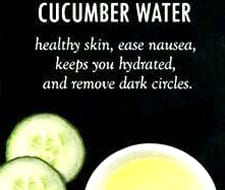
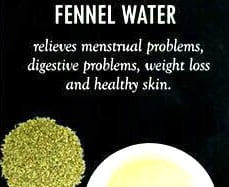

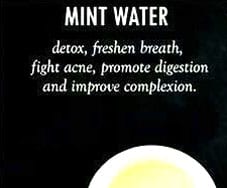

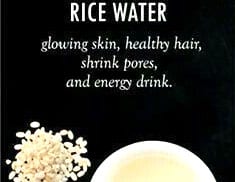
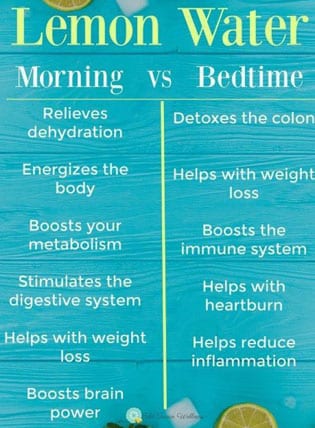
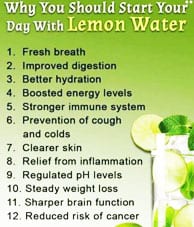
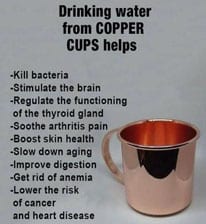

The Benefits of adding a slice of lemon to your water
Thank you for reading.
Your comments are welcome.
Michael
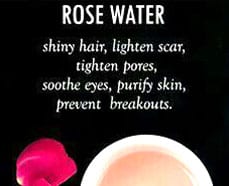
Interesting article you have written up here and I must say, I learnt another things through this post. Firstly, though I know of the various types of water and the functions it is used for but I never knew coconut water is this much of immense functions and can actually benefit the body to the extent of being offered to diarrhea patients. Wow! I guess I need to incorporate this to my daily in take too. Thanks
Hi RoDarrick,
Thank you for your comments. Much appreciated.
It is amazing how something as simple water is one of the most essential nutrients. Coconut water is full of electrolytes and does give you a nice natural energy boost.
Best wishes,
Michael
Another great article with loads of very useful information! Although I am aware of the many types of water available, I have to admit I’ve never given enough thought into the different processes involved to produce each type of water.
The information you present on distilled water was quite an eye opener! The older I get the more I realize the adverse effect grains (especially wheat, gluten) has on our bodies – reading your article is a welcome confirmation of my beliefs! Then to add to it, the story of how the use of distilled water resulted in what appears to be a miraculous recovery from arthritis is wonderful.
So nice to know that something as simple and natural as water has a profound effect beyond simple hydration!
Hi Susan,
Thank you for your comments. Much appreciated.
I also did a post on arthritis and found out unfortunately, there is no cure. Just ways to aliviate the pain and make life easier for those who suffer from this painful disease.
It is amazing how important water is to a healthy lifestyle.
Best wishes,
Michael
Hi Michael,
this is really great information. Im glad i bumped into your article. I come from a tropical country and we drink coconut water for its taste and readily availability not knowing that it has all these health benefits. And the fact that it is actually better than ORS is just amazing. I will definately share this information. Thanks for sharing.
Hi Janet,
Thank you for your comments. Much appreciated.
I was born in a tropical country where coconut water was plentiful, right out of the coconut. Never realized how good it was for you.
All the best,
Michael